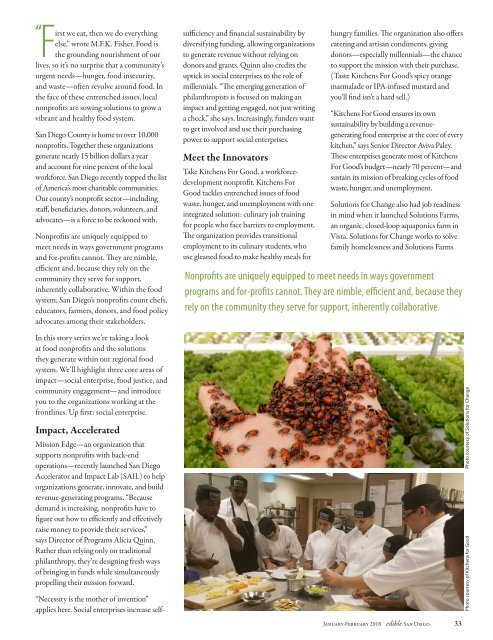Edible San Diego Issue 45 January/February 2018
E-edition of Edible San Diego Issue 45 January/February 2018
E-edition of Edible San Diego Issue 45 January/February 2018
You also want an ePaper? Increase the reach of your titles
YUMPU automatically turns print PDFs into web optimized ePapers that Google loves.
“<br />
First we eat, then we do everything<br />
else,” wrote M.F.K. Fisher. Food is<br />
the grounding nourishment of our<br />
lives, so it’s no surprise that a community’s<br />
urgent needs—hunger, food insecurity,<br />
and waste—often revolve around food. In<br />
the face of these entrenched issues, local<br />
nonprofits are sowing solutions to grow a<br />
vibrant and healthy food system.<br />
<strong>San</strong> <strong>Diego</strong> County is home to over 10,000<br />
nonprofits. Together these organizations<br />
generate nearly 15 billion dollars a year<br />
and account for nine percent of the local<br />
workforce. <strong>San</strong> <strong>Diego</strong> recently topped the list<br />
of America’s most charitable communities.<br />
Our county’s nonprofit sector—including<br />
staff, beneficiaries, donors, volunteers, and<br />
advocates—is a force to be reckoned with.<br />
Nonprofits are uniquely equipped to<br />
meet needs in ways government programs<br />
and for-profits cannot. They are nimble,<br />
efficient and, because they rely on the<br />
community they serve for support,<br />
inherently collaborative. Within the food<br />
system, <strong>San</strong> <strong>Diego</strong>’s nonprofits count chefs,<br />
educators, farmers, donors, and food policy<br />
advocates among their stakeholders.<br />
In this story series we’re taking a look<br />
at food nonprofits and the solutions<br />
they generate within our regional food<br />
system. We’ll highlight three core areas of<br />
impact—social enterprise, food justice, and<br />
community engagement—and introduce<br />
you to the organizations working at the<br />
frontlines. Up first: social enterprise.<br />
Impact, Accelerated<br />
Mission Edge—an organization that<br />
supports nonprofits with back-end<br />
operations—recently launched <strong>San</strong> <strong>Diego</strong><br />
Accelerator and Impact Lab (SAIL) to help<br />
organizations generate, innovate, and build<br />
revenue-generating programs. “Because<br />
demand is increasing, nonprofits have to<br />
figure out how to efficiently and effectively<br />
raise money to provide their services,”<br />
says Director of Programs Alicia Quinn.<br />
Rather than relying only on traditional<br />
philanthropy, they’re designing fresh ways<br />
of bringing in funds while simultaneously<br />
propelling their mission forward.<br />
“Necessity is the mother of invention”<br />
applies here. Social enterprises increase selfsufficiency<br />
and financial sustainability by<br />
diversifying funding, allowing organizations<br />
to generate revenue without relying on<br />
donors and grants. Quinn also credits the<br />
uptick in social enterprises to the role of<br />
millennials. “The emerging generation of<br />
philanthropists is focused on making an<br />
impact and getting engaged, not just writing<br />
a check,” she says. Increasingly, funders want<br />
to get involved and use their purchasing<br />
power to support social enterprises.<br />
Meet the Innovators<br />
Take Kitchens For Good, a workforcedevelopment<br />
nonprofit. Kitchens For<br />
Good tackles entrenched issues of food<br />
waste, hunger, and unemployment with one<br />
integrated solution: culinary job training<br />
for people who face barriers to employment.<br />
The organization provides transitional<br />
employment to its culinary students, who<br />
use gleaned food to make healthy meals for<br />
hungry families. The organization also offers<br />
catering and artisan condiments, giving<br />
donors—especially millennials—the chance<br />
to support the mission with their purchase.<br />
(Taste Kitchens For Good’s spicy orange<br />
marmalade or IPA-infused mustard and<br />
you’ll find isn’t a hard sell.)<br />
“Kitchens For Good ensures its own<br />
sustainability by building a revenuegenerating<br />
food enterprise at the core of every<br />
kitchen,” says Senior Director Aviva Paley.<br />
These enterprises generate most of Kitchens<br />
For Good’s budget—nearly 70 percent—and<br />
sustain its mission of breaking cycles of food<br />
waste, hunger, and unemployment.<br />
Solutions for Change also had job readiness<br />
in mind when it launched Solutions Farms,<br />
an organic, closed-loop aquaponics farm in<br />
Vista. Solutions for Change works to solve<br />
family homelessness and Solutions Farms<br />
Nonprofits are uniquely equipped to meet needs in ways government<br />
programs and for-profits cannot. They are nimble, efficient and, because they<br />
rely on the community they serve for support, inherently collaborative.<br />
<strong>January</strong>-<strong>February</strong> <strong>2018</strong> edible <strong>San</strong> <strong>Diego</strong> 33<br />
Photo courtesy of Kitchens for Good Photo courtesy of Solutions for Change
















